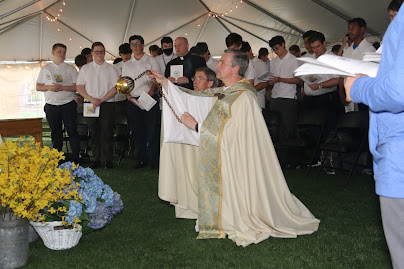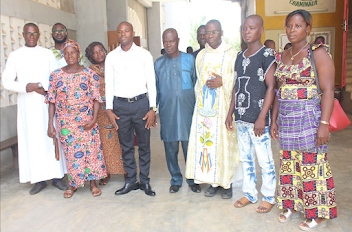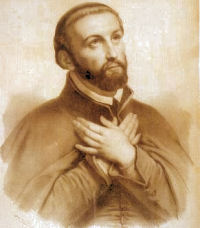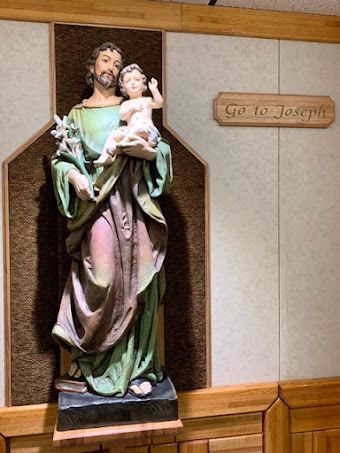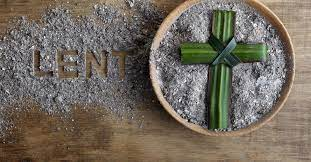Tuesday, August 16, 2022
Marianist Celebrations
Thursday, August 4, 2022
Saint John Vianney = pray for us
Monday, July 18, 2022
THE THREE O’CLOCK PRAYER
Lord Jesus,we gather in spirit at the foot of the Crosswith your Mother and the disciple whom you loved.We ask your pardon for our sins,which are the cause of your death.
We thank you for remembering usin that hour of salvationand for giving us Mary as our Mother.
Holy Virgin,take us under your protectionand open us to the action ofthe Holy Spirit.
Saint John,obtain for us the grace of taking Maryinto our lives as you did,and of assisting her in her mission.
May the Father and the Sonand the Holy Spiritbe glorified in all placesthrough the Immaculate Virgin Mary.
Amen.
Friday, July 15, 2022
The essential
My dear graduates of Chaminade, Kellenberg Memorial, and St. Martin de Porres Marianist School,
Recently, I read a description of refugees fleeing Ukraine. The author described a typical image of a woman on foot, carrying a single heavy bag of belongings. Such an image prompted the question: If you were forced to leave your home with one bag, unsure if you would ever return, what would you take with you?
What is essential? The use of the word essential has increased exponentially during the global pandemic, hasn’t it? Supplies, services, and even human workers have been identified as essential or not. One thing we might learn from the Ukrainian refugees is that the most important things in life are not things. The refugees are fleeing with so little because their own lives and the lives of their loved ones are more important than their homes, cars, and personal possessions. What is essential? People, relationships.
Two thousand years ago, Jesus, Mary, and Joseph were refugees themselves. I wonder what they considered essential for their journey? On several occasions, they traveled long distances, over fairly inhospitable terrain, on roads and paths far inferior to ours.
What is essential? I’m guessing the Holy Family packed pretty light. After all, Jesus would later tell his Apostles as he sent them out to preach: “Do not take gold or silver or copper for your belts; no sack for the journey, or a second tunic, or sandals, or walking stick.” (Mt 10:9-10)
July is a month when many of us end up traveling and therefore packing a bag. We ask ourselves: “What will I need? What is essential for this trip?” I am the first to admit I am terrible at packing. I leave it to the last minute and always bring way more stuff than I really need.
Imagine one more traveler: Blessed William Joseph Chaminade. It is 1797, and the Revolution is at the height of its fervor in France. Fr. Chaminade has ministered in secret to a faithful flock in Bordeaux for as long as he could, but now he is forced to go into exile. He travels to Spain, eventually staying in Saragossa for three years. As far as I know, we don’t have definitive information about his mode of transportation or his exact route, and we certainly don’t know what he packed in his bag. But Blessed Chaminade does offer an answer to that perennial question: What is essential? “The essential is the interior.” By this he means our heart, mind, and soul, the center of our self that defines who we are.
In the writings of our Founder, we find many references to the importance of the interior life. For example, Father Chaminade writes to one fellow Marianist: “Be careful that the great number of your occupations does no harm to the interior spirit.” Blessed Chaminade’s words ring true for all of us today. The stories of each of the travelers we’ve just met bring his point home that much more poignantly. The essential things in life are not things, but people: ourselves and every single human person we meet, because we are made in the image and likeness of God.
If our interior life is essential, how do we care for it? We don't have to travel long distances or pack a suitcase. This is the beauty of our Catholic faith: Prayer, Scripture, and the Sacraments of the Eucharist and Reconciliation are straightforward, readily available means to nurture our interior life. Hopefully, the summer affords us a little breathing room to work on the essentials.
Prayer is essential: We share our interior with God, and listen to the Father’s voice within us.
The Eucharist is essential: We literally receive Christ’s Body into ours and unite our soul with His.
Reconciliation is essential: We reunite our heart with God and all those from whom our sin divides us.
Ukrainian refugees, the Holy Family, and Blessed Chaminade were forced to pack a single bag and leave their homes for a long journey. Their circumstances pushed them to ask: what is essential?
As Christian pilgrims journeying back to the Father, we are blessed to be able to ask that question from a place of freedom, rather than fear and necessity. We can respond on a spiritual level, recognizing that “the essential is the interior” -- our interior, our heart and soul. Whether we are covering lots of miles this summer, or just sitting quietly on a beach, let’s give the essential its due and take time to cultivate our inner life, using this Magnificat magazine and all the beautiful means our Catholic faith offers. As Fr. Chaminade said to another fellow Brother: “Work at becoming an interior man, a man of faith.” And if there is anything any of us can do to help you, please don’t hesitate to reach out.
On behalf of all of my Marianist Brothers,
Fr. Peter Heiskell, S.M.
Thursday, July 7, 2022
Consecrated life - It is JOY.
A vocation is an invitation to love. It is the response to a call deep within the mystery of each heart. The heart of one called to religious life is kindled with a love that can only be satisfied by a total and radical gift of self to Christ who calls her to Himself. This animating response of love is expressed in the great JOY of a life freely given to God.
Wednesday, July 6, 2022
Life Testimony - Fr. Paul Landolfi, SM

Once, when writing an appreciation of Blessed William Joseph Chaminade, Father Paul Landolfi used words that could easily have been applied to his own life as well: “It is a fundamental truth of faith that God is always present in our lives, loving us, guiding us, and revealing himself to us. Usually, when we look back in retrospect, we recognize that God always has been with us.”
In Paul’s case, God’s provident care was intimately connected to the Society of Mary. The beloved teacher, chaplain and spiritual director had 73 years of religious profession when he died in 2017 at the age of 90. But he had actually spent nearly 85 of his years in the company of Marianists, having grown up in an orphanage run by them. He lost his mother when he was only five years old, and his father died a few years later; still, he found in the Brothers’ care a family spirit that sustained and nurtured him as a boy.
Greatly attracted to the life of the Marianists, he entered the postulate at the tender age of 14 and went on to profess first vows in 1944. Brother Paul then continued studies to become a teacher, and served in that capacity at several different high schools before entering the seminary in 1952. Ordained in 1955 at Fribourg, Switzerland, he returned to the United States and continued his ministry as a teacher, chaplain and administrator.
During these early years in the classroom, both his colleagues and the Brothers noted something special about his demeanor and spirituality. It was said that Father Paul never uttered a harsh word or committed an unkind act. Instead, he was revered as someone who practiced the beatitudes in everyday life and was known for being open, gentle and extremely kind.
Father Paul would go on to serve in a variety of ministries, including formation work and a return to his childhood residence, St. John’s Home in New York, where he served as chaplain. Ever an educator and always a learner, Father Paul eventually earned two master’s degrees, one in administration and the other in pastoral counseling.
By the mid-1970s, he was ready to begin a new phase of ministry, beginning a two-decade term in leading the Marianist Spiritual Renewal Center in Pennsylvania. In that role, he designed and provided programs of retreats, spiritual direction and religious instruction – encountering many Lay Marianists who were seeking to deepen their Marianist commitment. Renowned as a most devoted son of Mary, he also became widely known and loved for serving as a gentle guide who demonstrated a genuine, simple joy in all of his encounters.
Deeply respected for his insights into Marianist spirituality, Father Paul once shared thoughts from a “dream interview” with Blessed Chaminade about the unique nature of the Marianists’ vow of stability. Using his “voice of Chaminade,” he wrote, “I wanted Stability to mean [that] members would enter and remain in a state of being much more than in a place…I wanted persons who would not be fixed to a house but would be fixed in a state, the state of being devoted to Mary. That’s what Mary wanted. She wanted dedicated people who would help her. She wanted her sons and daughters to be open and docile to the Spirit of Jesus. This required more than permanence in a place.”
The everyday holiness first noted by the Brothers in the 1940s continued in Father Paul until his death. A resident at Chaminade High School in Mineola, New York, in his final years, he seemed to those around him to be a human stained-glass window of sorts – someone through whom the light of Christ, in all its radiance, persistently shines. Widely known in the Chaminade community as a kind and compassionate confessor, he also displayed an attitude that was bursting with life, invariably engaging those around him into action, thought and prayer. In the end, he died as he had lived, ever in the service of Mary, reciting the words of the Memorare along with members of his community.
Tuesday, July 5, 2022
Father Vicente Lopez de Uralde - Beatification process initiated
 ++++++ Consequently, his mortal remains were transferred on Saturday, June 25th, from the cemetery of Cadiz to the church of the Marianist Colegio of St. Philip Neri. The ceremony was presided over by the Judicial Vicar of the diocese, Pedro Belo, with the assistance of the diocesan notary, the Marianist Postulator General, Father Antonio Gascon, the superior of the community, Father Jose Antonio Barbudo, and numerous faithful, former students, Marianist religious, teachers of the Colegio and friends. Representing the Province of Spain were Father Francisco Sales (Assistant for Religious Life) and Brother Lander Gaztelumendi (Assistant for Temporalities). The mortal remains of Father Vicente rest in a beautiful chapel where they can receive the veneration of the faithful. We hope that in the coming year Father Vicente will receive the title of "venerable".  |
Monday, July 4, 2022
Independence Day
The Declaration of Independence
We celebrate American Independence Day on the Fourth of July every year. We think of July 4, 1776, as a day that represents the Declaration of Independence and the birth of the United States of America as an independent nation.
It wasn’t the day we started the American Revolution either (that had happened back in April 1775).
And it wasn't the day Thomas Jefferson wrote the first draft of the Declaration of Independence (that was in June 1776). Or the date on which the Declaration was delivered to Great Britain (that didn't happen until November 1776). Or the date it was signed (that was August 2, 1776).
So what did happen on July 4, 1776?
The Continental Congress approved the final wording of the Declaration of Independence on July 4, 1776. They'd been working on it for a couple of days after the draft was submitted on July 2nd and finally agreed on all of the edits and changes.
July 4, 1776, became the date that was included on the Declaration of Independence, and the fancy handwritten copy that was signed in August (the copy now displayed at the National Archives in Washington, D.C.) It’s also the date that was printed on the Dunlap Broadsides, the original printed copies of the Declaration that were circulated throughout the new nation. So when people thought of the Declaration of Independence, July 4, 1776 was the date they remembered.
In contrast, we celebrate Constitution Day on September 17th of each year, the anniversary of the date the Constitution was signed, not the anniversary of the date it was approved. If we’d followed this same approach for the Declaration of Independence we’d being celebrating Independence Day on August 2nd of each year, the day the Declaration of Independence was signed!
How did the Fourth of July become a national holiday?
For the first 15 or 20 years after the Declaration was written, people didn’t celebrate it much on any date. It was too new and too much else was happening in the young nation. By the 1790s, a time of bitter partisan conflicts, the Declaration had become controversial. One party, the Democratic-Republicans, admired Jefferson and the Declaration. But the other party, the Federalists, thought the Declaration was too French and too anti-British, which went against their current policies.
By 1817, John Adams complained in a letter that America seemed uninterested in its past. But that would soon change.
After the War of 1812, the Federalist party began to come apart and the new parties of the 1820s and 1830s all considered themselves inheritors of Jefferson and the Democratic-Republicans. Printed copies of the Declaration began to circulate again, all with the date July 4, 1776, listed at the top. The deaths of Thomas Jefferson and John Adams on July 4, 1826, may even have helped to promote the idea of July 4 as an important date to be celebrated.
Celebrations of the Fourth of July became more common as the years went on and in 1870, almost a hundred years after the Declaration was written, Congress first declared July 4 to be a national holiday as part of a bill to officially recognize several holidays, including Christmas. Further legislation about national holidays, including July 4, was passed in 1939 and 1941.
Saturday, July 2, 2022
Mass of Profession of First Vows - Togo
Bro. Patrice Agao, SM, with Fr. Jonas Kpatcha, SM, Regional Superior and his family. |
On Sunday, June 26, 2022, the Mass of Profession of First Vows of Patrice Médésso Agao took place in Kara, Togo. The celebration was presided over by the Regional Superior of the Marianists of Togo, Fr. Jonas Kpatcha, SM. The profession took place in the chapel of the Collège Chaminade in Kara.
Friday, July 1, 2022
Thursday, June 30, 2022
Oscar Romero, the Archbishop of San Salvador
There is freedom in these words. There is liberation in not judging all our efforts as futile before we even get started. There is peace in surrendering to what’s demanded and doing what’s possible. There is something salutary in contemplating our own mortality, as long as we don’t let it keep us from being fully alive. What we do matters, even if only for a little while.
Anyone can imagine a long stretch of time, whether it’s a thousand years from now or the few hours until the next bedtime, and use that as an excuse for procrastination or self-destructive behavior. That’s not hard to do, and it doesn’t make you a deep thinker. What’s hard is facing up to our limited existence and conscientiously fulfilling our daily obligations to God, others, and ourselves, whether we feel like it or not. The former leads to misery and despair, the latter to what the Bible calls “beatitude”—the joy experienced by the saints and angels who behold God in heaven face-to-face. How we act informs how we feel. Living an ordered life leads to having an ordered soul. And it all starts with making your bed in the morning.
This summer, make your bed every morning."
Monday, June 27, 2022
Marianist Monday
“Remember, brother, that the goal of your prayer is that God may be all in all. You do not pray simply because of your personal needs and wants, nor because of your finding comfort and consolation, nor to win the admiration of others, nor to appear wise in their eyes, nor for any other reason than to give yourself wholly and completely to God.”
Thursday, June 23, 2022
Paray-le-Monial
St. Margaret Mary's spiritual director was St. Claude de la Colombiere S.J. Both consecrated themselves to the Sacred Heart and promoted the devotion with much suffering.
In 1856, Pope Pius IX proclaimed the Feast of the Sacred Heart for the entire Church and exhorted the faithful to consecrate themselves to the Sacred Heart (1875).
St. Margaret Mary was canonized on May 13th, 1920.
Wednesday, June 22, 2022
Sr. Margaret Mary - Sacred Heart
let my heart never rest until it finds You,
who are its center,
its love, and its happiness.
By the wound in Your heart
pardon the sins that I have committed
whether out of malice or out of evil desires.
Place my weak heart in your own divine heart,
continually under your protection and guidance,
so that I may persevere in doing good and in fleeing evil until my last breath. Amen.
Tuesday, June 21, 2022
Heart of Jesus
fountain of every blessing,
I adore You, I love You,
and with a lively sorrow for my sins,
I offer You this poor heart of mine.
Make me humble, patient, pure, and wholly obedient to Your will.
Wednesday, June 8, 2022
Graduation moments
Both of our Marianist high schools celebrated their annual Commencement Exercises on Pentecost Sunday. Families and friends gathered to watch the events at the Hofstra Arena and Tilles Center.
Sunday, May 15, 2022
MARIANIST MONDAY
Saturday, April 16, 2022
Holy Saturday - 2022
The Mother stood grieving beside the cross weeping while on it hung her Son
The sorrowful Mother stood full of tears by the Cross while her Son was hanging thereThe grieving Mother stood weeping beside the cross where her Son was hanging
The Mother stood grieving beside the cross weeping while on it hung her Son
The sorrowful Mother stood full of tears by the Cross while her Son was hanging there
The mother of sorrows stood in tears beside the cross on which her Son was hanging
Weeping stood the Mother of Sorrows next the Cross, the while her Son hung there
The Mother stood sorrowing by the cross weeping while her Son hung there
The sorrowful Mother stood weeping before the cross where hung her Son
At the cross her station keeping, stood the mournful mother weeping, close to Jesus to the last.
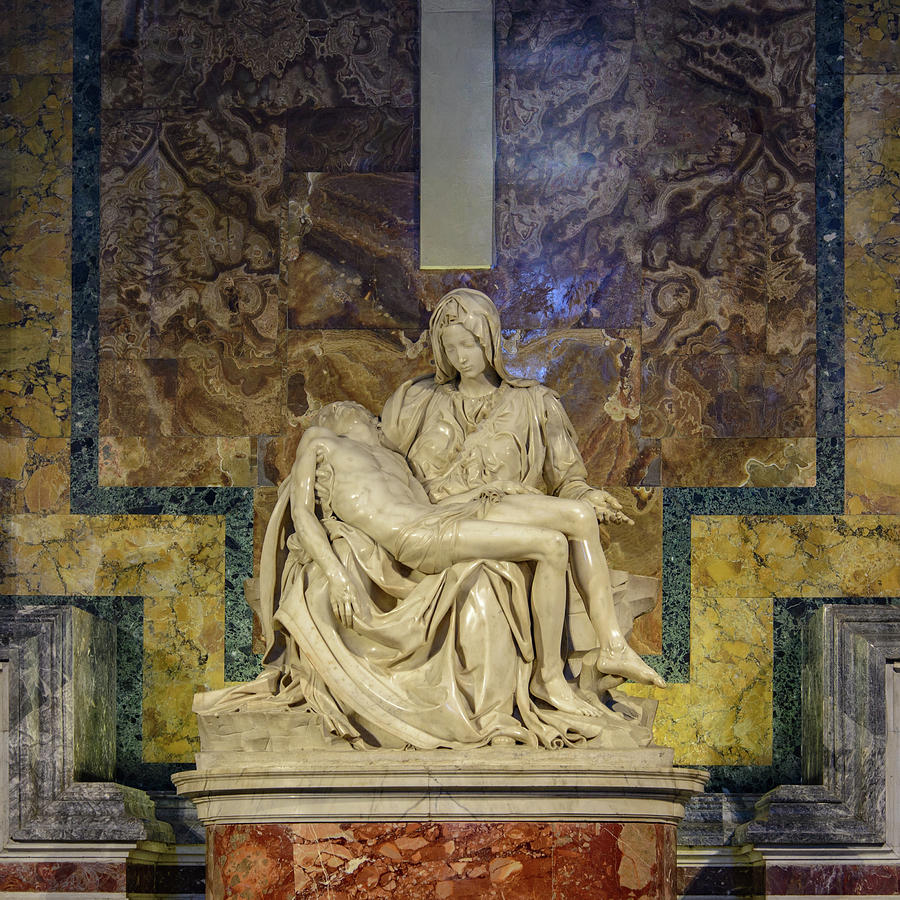
Friday, April 15, 2022
Holy Thursday 2022
Monday, April 11, 2022
Holy Week

Saturday, April 9, 2022
Peace for Ukraine

O great and almighty Lord,
Protect our beloved Ukraine,
Bless her with the freedom and light
Of your holy rays.
With learning and knowledge
enlighten us, your children small,
in love pure and everlasting
We pray, O Lord Almighty,
Protect our beloved Ukraine,
Grant our people and our country
All your kindness and grace.
Bless us with freedom, bless us with wisdom,
Guide into a kind world,
Bless us, oh Lord, with good fortune
For ever and evermore.
Thursday, April 7, 2022
Lenten forgiveness

Saturday, April 2, 2022
Lenten hope

Monday, March 21, 2022
Saturday, March 19, 2022
Saint Joseph - Patron
 From its very beginnings Saint Joseph served as the patron protector of the Marianists:
From its very beginnings Saint Joseph served as the patron protector of the Marianists:Father Leo Meyer, S.M., and Brother Charles Schultz, S.M., set sail for the United States on May 28, 1849. Their boat landed in New York on July 4, 1849, and on July 16 they arrived in Cincinnati, hio. Because of the cholera epidemic then taking its toll on the inhabitants of Cincinnati, Meyer and Schultz traveled to Dayton, Ohio, where they worked at Emmanuel Parish and cared for people suffering the effects of the epidemic. (Members of the Society of Mary still serve the needs of the parish community today).
At the end of July 1849, Father Meyer met John Stuart who owned 125 acres of land close to Emmanuel Parish. Stuart was eager to sell his proper- ty and return to France. He informed Father Meyer that he would sell him the property for $12,000. Though he had no money, Father Meyer agreed to buy the property. His first payment was a medal of Saint Joseph which was accepted by Stuart. Father Meyer was able to pay off the debt in 1861. The newly acquired property was called Nazareth.
SOCIETY OF MARY: MARIANISTS
JOHN HABJAN, S.M.
Marianist Province of the United States
Tuesday, March 15, 2022
Saint Louise de Marillac
Friday, March 11, 2022
400th Anniversary of Canonizations
On Saturday, March 12, 2022, we will celebrate the 400th Anniversary of the Canonization of St. Ignatius.
On March 12, 1722, St. Ignatius was canonized that day along with St. Francis Xavier, St. Teresa of Avila, St. Philip Neri and St. Isidore the Farmer.
Monday, March 7, 2022
Marianist Monday
March 2022
Dear Friends,
One of my favorite Christian songs is Chris Tomlin’s Good Good Father. You might remember hearing it often at XLT or on the morning announcements. For me, it’s one of those songs that gets stuck in my head for days at a time – whistling it down the hallway, singing it in the shower, playing it over and over while I’m working at my desk. While the melody and instrumentals are catchy, the lyrics
echo in my heart and my spiritual imagination, helping me to pray. The song is a gift to me, and I want to share with you my favorite verse and the refrain:
Oh, it's love so undeniable
I, I can hardly speak
Peace so unexplainable
I, I can hardly think
As You call me deeper still
As You call me deeper still
As You call me deeper still into love, love
You're a good, good Father
It's who You are, it's who You are,
it's who You are
And I'm loved by You
It's who I am, it's who I am, it's who I am
Sometimes we can get caught up in the idea that our worth depends on what we experience or
achieve: our GPA, our next internship, our good or poor health, our past relationships, or our tough
family situations, for example. The song reminds me that when I lose sight of God’s action in my life, it
is God who reminds me of who I am in His eyes. I am his beloved son, and He is my loving Father. St.
John Paul II sums up this truth perfectly, saying, “We are not the sum of our weaknesses and failures;
we are the sum of the Father's love for us and our real capacity to become the image of His Son Jesus.”
We are truly brothers and sisters of Jesus, so God is our Father who calls us deeper into relationship with Him. Just this past September, Bro. Andrew and I were blessed to be able to embrace that vocation to deeper communion with God by professing final vows as Brothers of the Society of Mary. “Brother” is not just a nice title to describe a Marianist who is not a priest; it is a constant reminder to me that God the Father has created me to love each and every person in my life as if he or she were my brother or sister – because it is who I am as a consecrated religious.
last summer. While challenging, the experience was a beautiful moment to step aside to hear the Lord
speak to me in silence and to fully embrace the vocation the Father has offered to me as a gift. Since the
time I started high school in 2007, I have been steadily growing in my relationship with Mary, the
Mother of Jesus, but I really wanted to deepen my devotion to St. Joseph, the husband of Mary. As I
prepared to consecrate myself to Mary for the rest of my life, I thought St. Joseph would be the perfect
patron saint to help me grow in my love for Jesus and Mary, just as he loved them during his life on
earth.
St. Joseph did not disappoint me in any way, and I knew I picked a good patron for the retreat
when I arrived at the retreat house in Columbus, Ohio and saw a tremendous statue of Jesus’ earthly
father. In fact, I realized that just as Jesus has a Good Father in Heaven, he has a good father on earth
too. While we know so little about St. Joseph, he was the man who showed Jesus and Mary the love of a father and husband. I spent many hours (I had a lot of time during 30 days of silence...) praying with
So, what does any of this have to do with this letter? This month, we both begin the sacred season of Lent, and we celebrate the Solemnity of St. Joseph, the Husband of Mary. While you are trying to decide on your Lenten practices and sacrifices, I thought I could suggest three quick lessons that I learned from St. Joseph on while preparing to make my final vows. They are taken from the Litany of St. Joseph and line up with each of the vows that the Brothers profess. I hope they will be
meaningful to you and start you off on a good path this Lent.
St. Joseph, lover of poverty, pray for us! Poverty enables us to love God and others more than we love the good things in this world. Does that mean you should get rid of everything you have and start begging? I personally don’t think so, but can you try to live more simply this Lent? Give up the
daily Dunkin’ Donuts run or try to rely less on Amazon. Are you wasteful or greedy with your time?
Make a spiritual commitment to procrastinate less. Maybe plan to leave for class a few minutes earlier
and spend the extra few minutes praying a decade of the rosary (or call your mom on the walk to class!)
We have so much in our lives; what can you give up for a few weeks to help you grow closer to Jesus?
St. Joseph, most chaste spouse, pray for us! The virtue of chastity is all about integrity.
on your playlist? Do you practice modesty and self-control? If you’re struggling with this virtue, maybe
reach out to a spiritual friend or mentor for some advice. It’s never shameful or too late to ask for help!
St. Joseph, most obedient, pray for us! None of us likes being told what to do. The virtue of obedience helps us to be open to God’s action in our lives. I know I often get confused by nice phrases like “Just do God’s will.” What does that even mean? Take the days of Lent to trust that God’s will is simply to love the real people right in front of you at any given moment. Focus especially on listening to what they say to you. If you start there, you can’t go wrong.
Lent is a time to remember that God is our Good Father whose love for us is undeniable and who
desires to give us peace beyond our comprehension, not only in Eternal Life, but right here and right
now. If you are looking for something to help you pray, I would suggest sitting down somewhere quiet
and offering the lyrics of this song as your words to God in prayer. Remember that you are loved by
God, and take some time with St. Joseph, the man Jesus was happy to call his father on earth. I pray
that this Lent will be a blessed one!
In Jesus, Mary, and Joseph,
Bro. Patrick Cahill, S.M.
P.S. Follow us on Facebook(Bro Stephen Balletta Or Marianists - Province of Meribah),
Instagram (brostephenballetta OR marianistsli) and Twitter (Bro Stephen Balletta
@MarianistsLI) for updates about the Marianists of the Province of Meribah.
Sunday, March 6, 2022
Lenten Immersion
If you’ve been unable to immerse yourself into the season of Lent, all hope is not lost. I want to offer you two very simple, yet powerful suggestions.
1. Do nothing!
Usually, during our Lenten, we hear about abstinence and/or taking on something– abstain from social media, from chocolate or anything that can distract us from God and perhaps become a kind of idol in our lives. One of the things that we do not think about is the idol of busyness.
2. Immerse yourself in this season of Lent
I’m not talking about praying the rosary or listening to spiritual talks on YouTube; these are all very good and have their rightful place in our prayer life and spirituality. However, they can lend to the busyness and distract us from some great thing that God may be trying to do in our lives. Take the downtime to clear your mind and become conscious of God’s presence around you like the trees and their fruits, the birds of the air, the dogs and the wind. Focus on your senses, your ability to breathe, see, hear, touch, smell, and taste. Notice, too, that I did not say to spend the nothingness in offering petitions.
Saturday, March 5, 2022
Lenten Silence
Think of Lent as a season of rest, said Paul Jarzembowski, author of the 2022 book “Hope from the Ashes: Insights and Resources for Welcoming Lenten Visitors.”
“Lent affords us some time to really be quiet. If that’s quiet in one’s personal prayer space; if that’s quiet getting in the car and going over to a church or a sacred space; if that’s online. Wherever someone can find that quiet and you know that you have the time to do,” he said.
Thursday, February 24, 2022
Prayers
He also appealed “to everyone, believers and nonbelievers alike” to make March 2—Ash Wednesday—“a day of prayer and fasting for peace.”
Monday, February 14, 2022
Marianist Monday
Hi, everyone, and Happy February. For this reflection, I have a simple question for you:
What do you consume?
I ask this question speaking as someone who consumes a lot, but I don’t necessarily mean food.
Although with Valentine's Day around the corner, I’m sure chocolate and a nice dinner are on the
horizon for many of you. Consumption doesn’t just have to do with the things we eat, though. We
consume all different types of things: media, literature, music. It all affects us one way or another, just
as the foods we eat do too. I’d like to propose some questions for self-reflection that you can use in prayer throughout this month. I pray that these help you on your pilgrim journey to God’s kingdom.
According to my Spotify Wrapped, I spent 60,547 minutes listening to music last year, which is over 40
days of songs (and that’s almost exclusively all music, because I’m not a big podcast guy). It’s mostly
mindless pop music, something I can put on and not think about, but even still, that inordinate
consumption of music affects and impacts me. Oftentimes, I take a step back and speculate that, if I
knew about American literature or biology the way I know lyrics to Taylor Swift’s songs, I would be the
most effective teacher alive. But unfortunately, my mental real estate is taken up by thousands upon
thousands of song lyrics, and most of them are not helpful to my everyday life.
Luckily, to combat the “love” songs of today and other musical messages of never-ending parties and
risky behavior, I get a generous helping of the songs of Scripture, the psalms. The Brothers sing the
psalms every day, and even without knowing it, we either allude to or straight up quote the psalms
regularly throughout our days because of our constant contact with them. In our consumption of the
psalms, we consume and are transformed by the words of God. With the words of the psalms on our
lips and in our hearts, our lives are directed to that constant prayer with God, using the words He
inspired and gave us to offer back up to Him. Arguably, these are still not “useful” for our everyday
lives, but they are pivotal for our journey to eternal life. So I ask you: What do you consume in
music?
Just as music and lyrics get into our heads, so too do the things we witness. As the old adage goes,
our eyes are the windows to the soul. Anything we take in by sight can move us to tears, outrage, joy,
fear, apathy, or even a mixture of many emotions. The commercialism of Valentine's Day takes
advantage of this too, emphasizing the need for physical beauty on a day dedicated to romantic love.
Beauty affects us profoundly, and through beauty, we get glimpses of the Divine with us on earth, since
there is nothing that is beautiful that doesn’t also participate in God’s beauty. Whatever we see and
willingly put before our sight is “consumed” by us, at least through mental understanding.
During February, we have the feasts of some powerful saints. These men and women are saints
because Jesus was always before them, in their sights, and they found Jesus in the people whom they
served.
I’m thinking of people like St. Josephine Bakhita, who, even after enduring slavery, found joy in a life
devoted to Christ, or St. Bernadette Soubirous, remembered during the Feast of Our Lady of Lourdes.
Cyril and Methodius were brother saints who brought the Gospel to the Slavs. All these and many
others distinctly saw Jesus in their lives. We too have the opportunity to see the Lord, particularly in
Adoration. Many of you, I’m sure, had powerful faith experiences at XLT, and I challenge you this
month to set the Lord before your eyes in Adoration. Worship the source of beauty and be willing to be
looked at in return by Him who watches over all of us. So I ask you here: What do you consume
visually?
Now let’s actually get back to food for a second. If you’re a recent graduate, you might be familiar with
the name Carlo Acutis, a young man with an ardent devotion to the Eucharist. We are blessed with the
opportunity to take into ourselves the One and Living God when we participate in Mass. Acutis knew
this so acutely that he felt it was his mission, his ministry, to reorient the world back to the Eucharist.
Our encounter with the Eucharist is an opportunity for us to be transformed, to become more like Him
whom we take into ourselves. A famous quote from Father Chaminade, plastered (quite literally)
throughout your alma maters is that “it is for us is an infinite honor to be like Him.” The Eucharist which we consume is our gateway, a contact point for us to begin and perfect that imitation. Just as the
things we watch and the songs we listen to shape our minds and our outlooks, maybe even our moods,
so does our consumption of the Eucharist shape our souls.
I like to remind the students on retreat with me, before we go into Mass, that what we're about to enter
into (the liturgy of the Eucharist particularly) is the SOURCE and SUMMIT of the Christian life. The
SOURCE, because without Jesus Christ, the Mass would not exist, we would not exist, for “in the
beginning was the Word.” He is the beginning and the end, the Alpha and Omega, and we are given a
great gift to be able to come before the Maker of All Things. So great is this gift that we also call it the
SUMMIT. The Eucharist is not only my origin, but it is also the best thing in which I will participate on
any and every given day. And that participation culminates in consumption. To consume the Lord and
to acknowledge this blessing, this gift, this grace, is the cornerstone of my prayer, of my life with God.
My prayers and those of all the Marianists at Chaminade and Kellenberg are with you. Be safe and
secure, and know that God loves you.
God Bless,
Bro. Peter Sennert, S.M.
P.S. Follow the Marianists on Instagram, Facebook, and Twitter, where you will find weekly videos and
frequent updates and photos of the Community.
Friday, February 11, 2022
Wednesday, February 9, 2022
Intercession of Blessed Chaminade

O Lord, you are constantly at work in your Church
Monday, January 31, 2022
St. John Bosco

Did you know Don Bosco is the patron saint of Catholic Publishers?
Why printing presses? Because, in his own words:
“Only God knows the good that can come about by reading one good Catholic book.”







